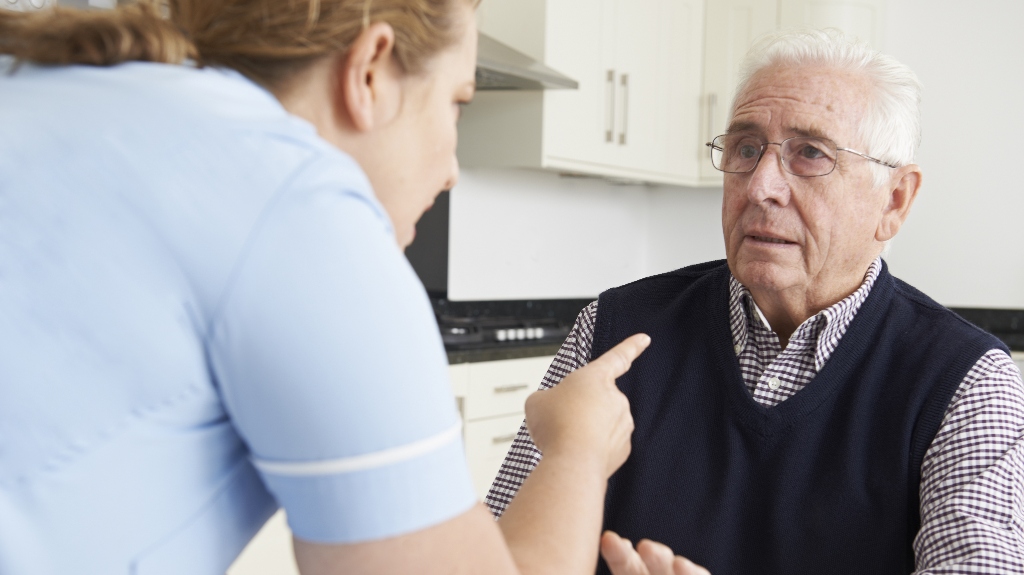Nursing Home Abuse/Neglect Attorneys Joplin MO
When families place a loved one in a nursing home or assisted living facility, it is with the expectation that the person will receive compassionate and competent care in a safe environment. Sadly, that’s not always the case. Thousands of Americans suffer nursing home neglect and abuse each year due to negligent hiring practices, understaffing, inadequate training and poor medication management, among other mistreatment. However, these numbers represent just a fraction of the actual cases that go unreported. To make matters worse, elder abuse often occurs in nursing homes and other recovery institutions. So what can you do if you suspect that your loved one is suffering while living in a long term care facility?

Our personal injury lawyers at Dreyer & Tinney, work as legal advocates for senior citizens, the disabled, and those living in nursing centers, group homes, and assisted-living facilities.
Call our nursing home attorneys at 417-782-6822 or use the contact form today to schedule a free consultation.
All confidential or sensitive information you share about the nursing home abuse case remains private through an attorney-client relationship.
The Devastation of Elder Abuse
Studies have shown that almost 15% of patients have been victims of neglect by their caregivers. Additionally, according to the World Health Organization, 2 in 3 staff members admitted to committing abuse in the last year.
Elderly patients often face a higher risk for nursing home neglect as they’re seen as defenseless and unable to speak out about what’s happening around them. Unfortunately, this makes it all too easy for nursing home employees to mistreat patients with impunity.
Nursing home negligence can take a terrible toll on those who suffer from it.
It’s even known to cause wrongful death in some nursing home abuse cases. Because victims fall into depression or lose the will to live, they struggle to cope with the daily torment of negligent staff members and other nursing home residents.
The Nursing Home Abuse Lawyers at Dreyer & Tinney Can Help You File A Nursing Home Claim
The elderly population is often the victim of nursing home elder abuse. If an abusive caregiver has injured you or a loved one in your nursing home, contact our experienced attorneys at Dreyer & Tinney to discuss your legal options.
The attorneys at Dreyer & Tinney have received multi-million verdicts for victims who have suffered nursing home negligence and were exposed to health and safety hazards to get the compensation they deserve for their injuries.
We are committed to holding negligent long-term care facilities, including assisted living facilities, accountable for poor care resulting in a resident’s injury or death, with all the applicable nursing home laws.
A nursing home abuse lawyer from our offices can file a nursing home negligence case to recover compensation for your family members’ pain, physical health problems, and medical bills.
Call our law offices at 417-782-6822 or use the contact form today to schedule a free consultation if you believe a loved one has been a victim to nursing home neglect or abuse.
Types of Nursing Home Abuse
There are different types of elder abuse in nursing homes, including physical abuse, emotional abuse, sexual abuse, neglect, and exploitation.
1. Physical Abuse
Physical neglect includes anything that deprives residents of their primary needs for survival and dignity, including food, warmth, shelter, and a sanitary environment. Physical abuse in nursing homes happens whenever a resident suffers bodily harm, pain, or impairment because of mistreatment or neglect. Physical abuse can consist of:
- Active abuse (hitting, punching, slapping, kicking, etc.)
- Physical neglect
- The misuse of physical restraints
In nursing homes, staff members are only supposed to use restraints for medical reasons and for a short time. Keeping restraints on patients for long periods can reduce muscle tone and bone mass and cause muscle disorders and other serious injuries. Nursing home caregivers, visiting family members, and other residents are the primary abusers in nursing homes.
2. Neglect
Neglect refers to a caretaker’s failure to provide food, shelter, medical care, or protection. General and medical neglect can lead to:
- Bedsores
- Infections
- Sepsis
- MRSA
- Malnutrition
- Dehydration
- Choking
- Clogged Breathing Tubes
Neglect is different from abuse in that it usually refers to an unintentional act. An example of neglect is if a nursing home resident wanders from the premises and dies from hypothermia while lost outside. Another example is when a nursing home employee fails to change a resident’s position in bed and, as a result, the resident develops bedsores.
3. Sexual Abuse
Sexual abuse is any non-consensual sexual contact. Unfortunately, this type of abuse is a prevalent form of elder abuse. Common signs of sexual abuse include bruises around the breasts or genital areas and unexplained sexually transmitted diseases.
Signs that Someone May Be Abusing Your Elderly Loved One
Although nursing home abuse is sometimes difficult to detect, there are some specific warning signs you can look out for when visiting with your elderly loved one. Signs of nursing home abuse include:
- Bruising
- Broken bones
- Scrapes
- Cuts
- Abrasions
- Burns
- Tears around the genital areas
- Unexplained sexually transmitted diseases
- Withdrawal from activities they used to enjoy
- Unusual changes in sleep or behavior
- Increased or unreasonable fear or anxiety
- The sudden onset of depression
- Untreated bedsores
- Poor hygiene
- Unexplained weight loss
- Lack of medical aids, such as glasses, hearing aids, dentures, medications, or walkers
Any of these tell-tale signs can indicate that someone may be abusing your loved one. Know these signs to better protect your family member and stop the abuse that may be happening.
Types of Nursing Home Neglect
1. Frequent Slips and Falls
Because slips and falls by older people can quickly lead to death, nursing home employees must monitor vulnerable residents at risk of falling. Specifically, individuals with cognitive problems or physical impairments are at high risk.
You may notice that your loved one has recently had frequent slips and falls. Falling often may be a sign of elder abuse or neglect.
2. Malnutrition/Dehydration
Our bodies need water to survive. Water gets rid of bodily wastes through urination, sweating, and bowel movements. These processes keep the body’s temperature regular, lubricate joints, and protect tissues. Dehydration happens when the body is not functioning correctly because of too little water in the body.
- A sticky and dry mouth
- Being thirsty
- Dry or papery skin
- Infrequent urination
- Dark yellow urine
- Confusion and irritability
- Delirium
- Breathing fast
- Low blood pressure
- Inability to sweat
Dehydration is a common problem among the elderly in many nursing homes, and it’s a sign of serious neglect. Nursing homes must ensure that residents get plenty of water. When an older person becomes dehydrated, they may lack a strong thirst drive and might not show any outward symptoms of lacking hydration. Chronic dehydration in elderly persons can lead to seizures, brain swelling, kidney failure, and even comas.
Malnutrition, or having insufficient nutrients in the body, is also a common sign of neglect in nursing home residents, with about 85% of nursing home residents suffering from this dangerous condition. Malnutrition can lead to weight loss, fatigue, weakness, yellowing skin, white fingernails, and bedsores.
3. Fractures
Fractures and bruises are common signs of physical abuse in nursing homes. If a nursing home is taking proper care of your loved one, they shouldn’t suffer from either of these conditions.
Falls often cause fractures and are particularly dangerous to an older adult. A fall may break the person’s hip, which can quickly lead to death. The nursing staff should be taking all necessary precautions to prevent elderly residents from falls.
Precautions should include ensuring that the residents use walkers, canes, or wheelchairs and have assistance when getting in and out of beds.
4. Bruises
Bruises can result from falls, bumps, and more severe injuries. Older people tend to bruise more easily than young people because their skin tissue is thinner and more delicate. In addition, the use of blood thinners by some elderly people may also increase the chances of bruising. Although bruises can occur in older adults without any accompanying neglect, they could also be a sign of abuse, so it’s important to pay extra attention to bruises apparent on your elderly loved one, mainly if they’re reoccurring or if they appear on the wrists or ankles, which might indicate misuse of restraints.
5. Incorrect Medication
If your elderly loved one received incorrect medication or lacks needed medication, this could be a sign of elder abuse. At the very least, it shows that the nursing home didn’t properly train their nursing staff. Errors in administering medication include:
- Crushing medication that shouldn’t be crushed
- Not providing food or water with the medication
- Giving the medication at the wrong time or giving an incorrect dosage
- Giving the patient expired medication
- Over-medicating the patient to subdue or control them
One common form of nursing home abuse is giving residents medications they don’t need for the sole purpose of sedating them when it’s not medically necessary. Signs that your loved one has received incorrect medication include changes in their behavior, unexplained weight loss or weight gain, confusion, memory loss, and lethargy.
6. Bedsores
Bedsores develop when a person spends long periods in a chair or bed without moving around. Signs of bedsores are discolored or painful skin and open wounds on parts of the body, usually the hips, buttocks, back, and ankles. Bedsores are a sign of neglect because nursing home employees must move elderly patients who can’t move around by themselves. Bedsores can lead to serious medical complications and even death.
Do You Suspect Nursing Home Neglect? Get Legal Help Now
Once you contact a lawyer at the Dreyer & Tinney, they will schedule an appointment with you to discuss the medical care of your loved one.
This free legal case review is used to meet you and for the attorney to discuss your case in detail and answer any questions you might have.
Call our abuse lawyer at 417-782-6822 or use the contact form today for a free legal review.



